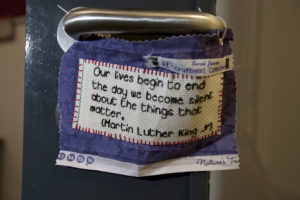
Have you ever thought about your spending purchases from an ethical standpoint? Not too many people give daily consideration to where and how the products they buy are made. With us being a cog in what is essentially a global economy, it makes sense to know where your hard earned dollars are going. When you purchase something that was made in a foreign country, are your dollars potentially supporting that country’s dictatorship? Are the workers treated well? Do they make a living wage?
It is important for you to remember that as a consumer, you can be a voice for change. We all want to get good value for our purchases; economics play a large role in our spending decisions. But there are some ethical considerations you might want to ponder as well.
Where was the item made? Retailers will take notice if a large number of people start questioning them about where their products are made, what conditions are like for the workers who made them, and whether they were treated fairly and paid a living wage.
Where will the product go when you are done with it? None of us keeps everything forever, but some items are especially transitory. Many products we use, like bottled water, are meant to be one-time usage products. Can you use glass bottles or a stainless steel cup instead? Those items can be washed and used over and over again, reducing the amount of waste that is buried in the ground.
Are you willing to purchase used items? Buying something that someone else has used and discarded is recycling at its finest. You not only get a great deal, money-wise, but you also keep useful items out of the landfill and lower the environmental costs of producing a brand new item.
Do you buy or use local products? Eating local foods reduces transportation costs and the environmental impact of hauling food cross-country. And by supporting locally owned businesses, you keep your money within your community.
Can you buy less stuff? Everything we bring into our home has to be maintained in some way, shape, or form. Think about how much of your time is going to be given over to maintenance of that item. Will you also have to invest more money into the product so you can keep using it (for example, batteries)?
Where will your dollars go after you make your purchase? Will those dollars be used against you, or a person like you? Will your money help build a better world for the person who made the item, or will it line the pockets of the corporation (or multi-million dollar sports star) whose name is on the product??
We only get a couple of opportunities a year to vote in elections (primary and/or general). Those elections eventually shape our government and communities. But we get opportunities every day to influence the world when we lay our hard-earned dollars down at the cash register. By using that consumer power, which is huge, we are making impacts that benefit all people in more equal ways.
